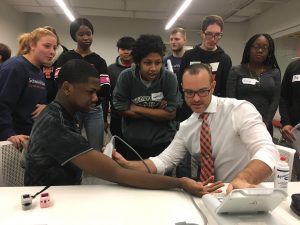A growing number of undergraduates are choosing Health and Exercise Science as a major as the programs offer diverse opportunities for learning.
At the beginning of her sophomore year, Jessica Pascolla ’19 began conducting research in the Muscle Biology Laboratory on South Campus.
A year ago, as a junior, the health and exercise science major presented at the American Physiological Society’s undergraduate research conference on experimental biology in San Diego. Her presentation title was “Effects of Agmatine Exposure on Skeletal Muscle of Aging Rats.”
She attends the conference again this year, in Orlando, Florida, to present her current research on a model of Down syndrome.
More than 250 students—which is over half of the School of Education’s undergraduates—major in health and exercise science, seizing opportunities to conduct research in one of six labs.
“I enjoy doing hands-on research, because it allows me to better understand mechanisms that we learn about in class. I feel as though I can contribute to class discussions and am able grasp concepts better,” says Pascolla.
The B.S. program in health and exercise science provides students experience with and an understanding of the physiological, mechanical, and psychological aspects of physical activity and health-related behavior. Students examine all aspects of human performance, including a background in natural sciences, human physiology, anatomy, metabolic and muscular systems, and research and testing protocols.

“The discipline of exercise science kinesiology has seen dramatic growth in the United States over the last 20 years, fueled primarily by students interested in sport and allied health-related careers,” says Professor Tom Brutsaert. “Most degree programs offer a B.S. that is grounded in the natural sciences. This offers students the appeal of a rigorous degree program that is often coupled with a personal and lifelong interest in sport, human performance, and health.”
In the SOE, the undergraduate numbers in health and exercise science have nearly doubled in the past ten years, Brutsaert says. “Given the number of applicants to the program, we could likely double again if space and faculty numbers permitted.”
Pascolla knows how much undergraduate research can shape a student’s career orientation. She originally planned to attend graduate school for a doctor of physical therapy degree. But after her lab work, she says she wants to explore a D.P.T./Ph.D. or M.D./Ph.D. program.
She has received a National Institutes of Health grant as a diversity supplement to represent Native Hawaiian/Native American women in the biomedical research field. “It allows me to work in the lab with a reimbursement and represent minorities in the scientific research field. This is an opportunity I would never have had if I did not decide to get involved in research,” Pascolla says.
She explains the project she’ll present this spring at the research conference on experimental biology: “Roughly 40 percent of people with Down syndrome experience sleep apnea, more prevalent in children. We are looking at breathing patterns, muscle morphology, spinal cord motor neuron assessment, and proteasome activity. Our interests center on the involvement between diaphragm muscle and nervous system etiology,” the cause of this abnormal condition.
Gwendolyn A. Thomas is an assistant professor of Exercise Science and Director of the Exercise Prescription Laboratory, which conducts acute and chronic exercise research protocols that give students opportunities in applied exercise prescription and lab analytical skills. “Hands-on research is extremely valuable for undergrads because it gives them an opportunity to explore different avenues of research that our labs are conducting,” says Thomas. “It’s an opportunity to get students excited about how scientific principles can facilitate their career goals in clinical, medical, sport or research settings.”
Exercise Science Research labs include:
- Altitude Simulation Laboratory
- Exercise Prescription Lab
- Human Behavior Measurement Laboratory
- Human Performance Laboratory
- Muscle Biology Lab
- Institute for Human Performance at Upstate Medical University
